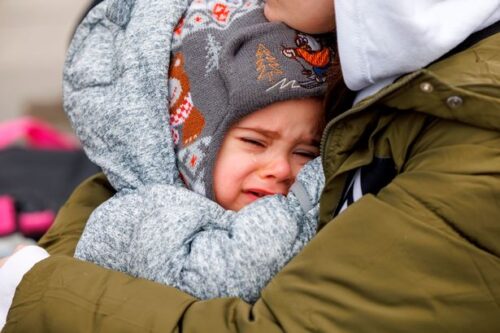The atomic bomb began as a moment of lightning in a brain, a nanosecond shutdown of the visual cortex as the insight that unwrapped the splitting of the atom came to Leo Szilard as he stepped off a curb to cross a street in London on a gray, rainy morning on Tuesday, September 12, 1933. As Richard Rhodes describes it, “time cracked open before him and he saw a way into the future, death into the world and all our woe and the shape of things to come.” * In that moment he saw the mechanism that could release the energy of the atom. The Bomb was the product at the very end of the chain that began here.
It is not uncommon for technological leaps to occur in multiple places in a condensed period of time. The knowledge produced by previous scientists is taken up by contemporary ones. A kind of synergy pulls ideas into life.
Still, maybe if Szilard had not been out walking, lost in thought, maybe his eureka moment would never have happened, maybe no one else would have cracked the code, maybe the human race would not, right now, be waiting at the edge of a cliff for a miscalculation or moment of pique or some bit of rational madness for it all to end with Russia lobbing tactical nukes about Ukraine and the US and NATO responding.
We are talking about nuclear war now – Putin’s threat and by way of one reply, Biden’s very clear line about how we will not fight in Ukraine.
The problem is, we have been watching, we are watching, we will be watching.
Unlike any previous war, we have an infinite array of images, videos, reports and speculation about Russian attacks on Ukraine. Therefore, we have an infinite array of images of death, smashed cities, crying, frightened children.
The United States has not intervened by attacking Russian positions to relieve Ukrainian cities or even with threats to do so, because we do not wish to escalate a dangerous situation into a catastrophic one. There is nothing else after the end of the world.
In Ukraine, unlike in Iraq or Afghanistan or with torture or in Vietnam, the United States has not given into ‘imperative driven thinking’, the belief that we must act immediately, and that if we do not act, something more terrible will occur. Our recent history shows us the consequences of that trap – mountains of bodies, trillions of dollars thrown away.
Once we accept the necessity of immediate military action, once the decision-makers shut down debate by shouting about moral and strategic must-do’s, then rational madness takes over. The rational minds of the best and brightest say “we can do x, we can do y, do z … and we must … and therefore we will.”
Faith overrides a deliberate analysis of consequences or it obscures such an analysis or dismisses it. And because we believed we were righteous to act, we have faith it will all work out … because we are righteous, because we must save or come to the rescue or prevent more slaughter, or a dictator’s continuation in power or threats to the free world.
And we forget about the ‘fog of war’. And we forget about circuitous thinking. And we forget about our past failures. And we forget about our own hubris.
So let’s set up a no-fly zone over a country the size of Texas … which means several hundred NATO planes in the air over Ukraine 24/7 when one pilot’s error or one glitch in a radar system or one errant missile could provoke retaliation which could provoke a counter-strike which could … which could … and then …. All of this ‘managed’ by rational men and women … who once they began thinking in ‘imperatives’, chose to enter a realm of chaos that could result in the slaughter of uncounted millions of crying, frightened children. Hannah Arendt knew that “honorable people can do terrible things.”
The problem is, we have been watching, we are watching, we will be watching … disabled children trapped under artillery fire; a pregnant woman, belly bared, being carried on a stretcher; city streets lined by the shells of apartments and stores; exhausted fighters, an exhausted Zelensky; agonized mothers reaching a border weeping in relief and despair and worry; mass graves; broken, anonymous bodies; charred tanks and helicopters and trucks on cratered highways; the glow of fires in the night, of flares, of tracer fire. And of children separated from their fathers, of orphaned children, wounded children, the loss of children – the cumulative weight of the murder of innocents and the destruction of a country.

Shakespeare understood the horror and cruelty of such formulas well enough. He knew that we cannot declare something to be the worst “so long as we can say ‘this is the worst’.”
At the end of our worst is atomic dust and silence.
What we are being asked to do is somehow balance the brutality of real murder vs the abstraction of possible murder – the present deaths of Ukrainians vs the potential deaths of Poles, Germans, Romanians, Americans, etc. The moment-by-moment destruction of Ukraine vs the theoretical annihilation of tens of millions.
*The Making of the Atomic Bomb by Richard Rhodes